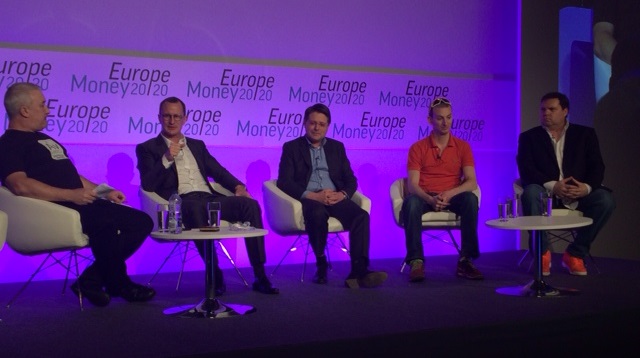"Surely, points of sale are dead – no one wants to be herded like cattle to a single point of sale," says renowned fintech-tainer Andrew Vorster, unafraid to share his personal views with an eager crowd of suits and the odd pair of jeans, as he has invited a panel on stage to explore POS as an open hub of activity at Money20/20 Europe earlier this month.
LevelUp, which offers mobile payment services within the US restaurant segment, sees rapid growth in consumers opting to tap their mobile phones, sometimes even using them to order and pay ahead:
"Whether or not you need points of sale depends on how you define them. I would argue that the only point of sale that exists is the mobile device that you probably have in your hand or in your pockets. There will be a centralised computer that the merchant uses to manage inventories and process payments and so on, but what we're seeing in the States in the restaurant industry is that as a customer you order ahead from your phone, skip the line, get your loyalty rewards and go straight to picking up your food," says Seth Priebatsch, who is Chief Ninja at LevelUp, pointing out the extreme transition currently taking place:
"You're seeing a very rapid consumer movement away from the point of sale to the mobile device, at which point I would argue that this becomes the point of sale, and that what we today think of as the point of sale is just a mainframe, a computer somewhere."
Meanwhile, it could be argued that the industry tends to focus too much on the hardware, ignoring the significant amount of software already behind the very same hardware - and more yet to come:
"I see the hardware as the check-out button in young people's pay trail – somewhere for the consumer to focus to conduct the payment. Basically, merchants will be thinking about making payments simple in the store – they want a solution that works, with the infrastructure needed. If that requires a piece of hardware, somewhere for the consumer to interact, then that's what there'll be," says Jan Lundequist, SVP Product Management, Nets.
Loyalty about relevance
As one person's loyalty could be another person's spam, should consumers worry about their data being out there? Not if it is up to US-based Seth Priebatsch who perceives privacy as a false construct, arguing that while privacy is about not tricking people, loyalty, on the other hand, is all about relevance.
"So as long as loyalty is an open and clear contract from the merchant, and as long as they do it in a relevant way, I don't think it has to be spam, I think it can be very open and relevant."
Making payments simpler for merchants
According to recent figures by the European Commission, the Nordics is the most digitised region in Europe, making it an obvious place for cashless payments to take place. Jan Lundequist, Nets, confirms that pattern, and he believes digital payments are more secure and efficient than cash payments. Recent requirements that all merchants go PCI and DCC compliant, paired with the general data protection regulations, however, mean that merchants could potentially be bogged down in compliance unless someone lifts part of that burden.
"We should look beyond the hardware to the fact that merchants want the whole package, including the infrastructure and security set-up behind it. It's not so important which 'pay' is at the end of the line – what matters is that consumers can pay when they need to pay, and that merchants don't have to worry about security issues," says Jan Lundequist, adding that while merchants do not care about payments as long as they get paid, it is quite another matter if they don't. Jacques Behr, EVP EEMEA, Ingenico, agrees:
"It's very simple – merchants want to grow their business, and because of all the omni-channel, online, mobile, instore payment, it is becoming more and more complex, not least with the security and PCI requirements. So our mission is to take care of all that for them to be able to focus on expanding their business and have more and more people come into their stores. All the infrastructure, the payment system, has to work – it's about security and reliability, it's about trust."

The panel:
Jacques Behr, Ingenico Group, Seth Priebatsch, LevelUp, Glen Robson, Verifone Systems and Jan Lundequist, Nets, discussed 'POS-itive innovations: POS as an open hub of activity' at Money20/20 Europe 5 April 2016. The panel was moderated by Andrew Vorster.
